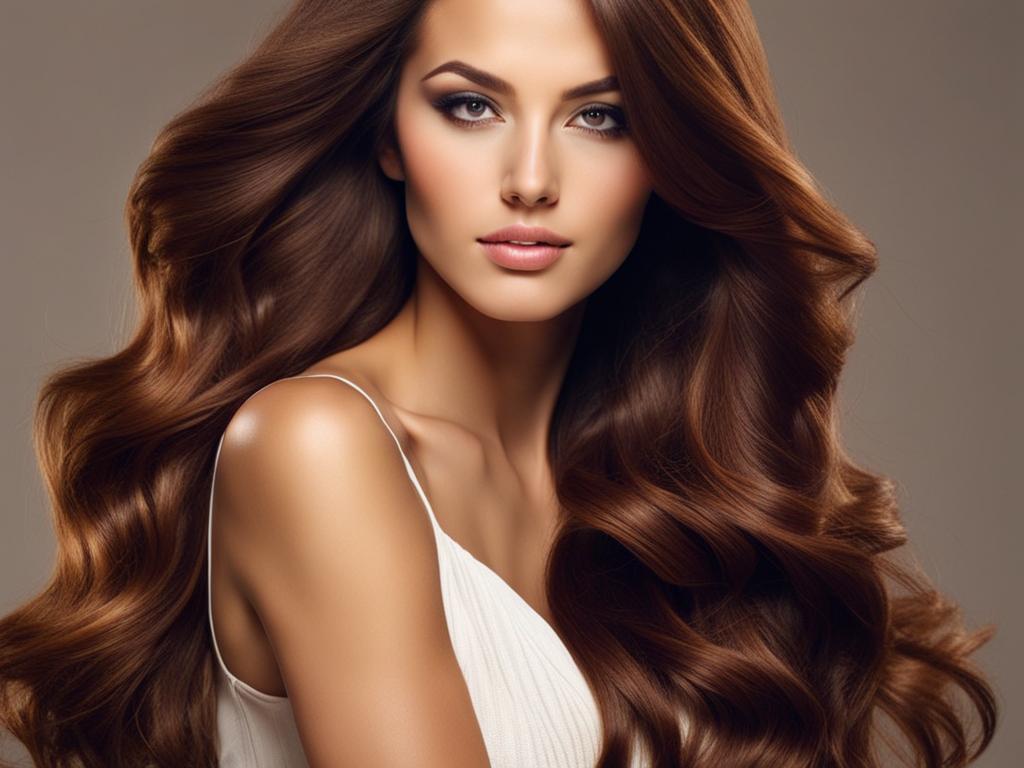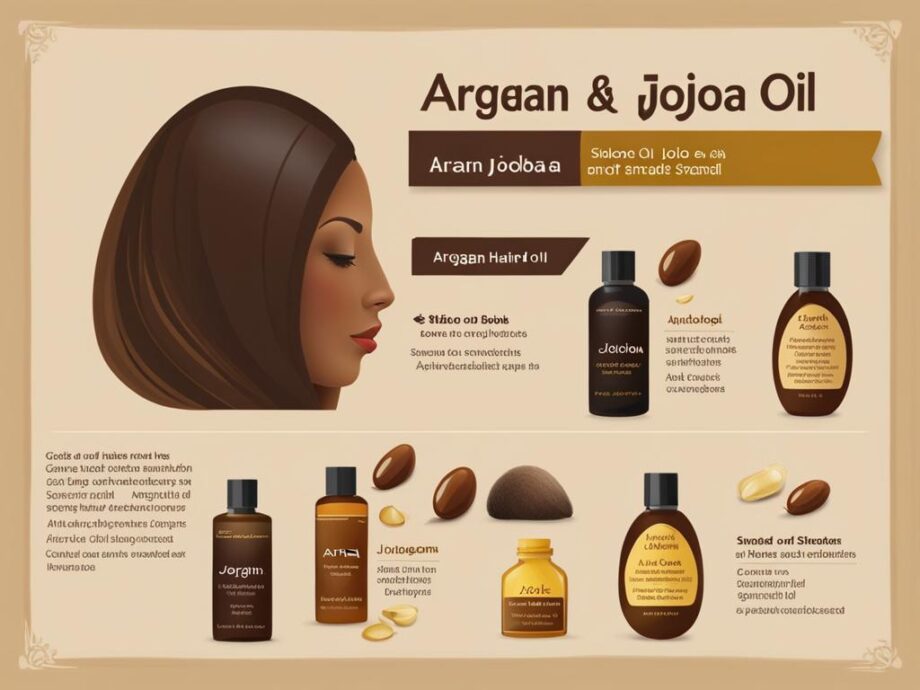Argan oil and jojoba oil have become increasingly popular choices for hair care. Both oils offer various benefits that can improve the health and appearance of your hair. But which one is the right choice for you? In this article, we’ll compare the hair care benefits of argan and jojoba oil, so you can make an informed decision and achieve healthier, more radiant locks.
Key Takeaways:
- Argan oil and jojoba oil have unique properties that make them suitable for different hair types.
- Argan oil is beneficial for promoting hair growth, hydrating dry hair, and nourishing damaged hair.
- Jojoba oil helps balance oil production, soothes the scalp, and improves hair texture.
- When choosing between argan oil and jojoba oil, consider your hair type and concerns.
- You can experiment with a blend of both oils to reap the benefits of each.
Argan Oil Benefits for Hair
Argan oil is a versatile and nutrient-rich oil that offers numerous benefits for hair care. This prized oil is extracted from the kernels of the argan tree, which is native to Morocco. Argan oil has gained popularity in recent years, thanks to its ability to nourish and repair hair. Let’s explore the various benefits of using argan oil for your hair!
Argan Oil for Hair Growth
If you are struggling with hair loss or slow hair growth, argan oil may be the solution you’ve been looking for! This oil contains essential fatty acids, including omega-3 and omega-9, that help promote healthy hair growth. The vitamin E in argan oil also stimulates the production of new hair cells, leading to thicker, fuller hair.
Argan Oil vs Jojoba Oil for Hair Growth
While jojoba oil can also support healthy hair growth, argan oil has a higher content of vitamin E, a potent antioxidant that protects hair from damage and supports healthy growth.
Argan Oil for Dry Hair
If you have dry, brittle hair, argan oil can help restore hydration and moisture balance. The oil’s high content of healthy fatty acids, including oleic and linoleic acids, softens and smoothens hair, resulting in a lustrous appearance.
Argan Oil vs Jojoba Oil for Dry Hair
Both argan oil and jojoba oil are effective in treating dry, damaged hair. However, argan oil’s deeply moisturizing properties may be more suitable for excessively dry hair.
Argan Oil for Damaged Hair
Argan oil can help repair and rejuvenate damaged hair by repairing the hair shaft and restoring lost moisture. Its abundance of nutrients, such as vitamin E and omega-3 fatty acids, nourish hair from within, leaving it healthier and more resilient.
Argan Oil vs Jojoba Oil for Damaged Hair
Both argan oil and jojoba oil can be used to repair damaged hair. However, argan oil’s ability to deeply penetrate the hair shaft and provide intense nourishment makes it a more effective choice for severe damage.
Argan Oil for Frizzy Hair
Tired of uncontrollable frizz? Argan oil can help tame and smoothen frizzy hair, leaving it silky and manageable. Its conditioning effects minimize hair breakage and promote a healthy shine.
Argan Oil vs Jojoba Oil for Frizzy Hair
Both oils work well to tame frizz, but argan oil may be more effective due to its higher concentration of unsaturated fatty acids.
Argan Oil for Thinning Hair
Argan oil can also help reduce hair breakage and thinning by strengthening hair follicles. The oil’s high vitamin E content and antioxidant properties can promote hair growth and restore thickness to thinning hair.
Argan Oil vs Jojoba Oil for Thinning Hair
While jojoba oil can also support healthy hair growth, argan oil’s combination of fatty acids and antioxidants make it a more effective choice for thinning hair.

Jojoba Oil Benefits for Hair
Jojoba oil is a natural oil extracted from the seeds of the jojoba plant, a shrub that grows in the desert regions of the southwestern United States. This nutrient-rich oil has been used in hair care for centuries due to its numerous benefits.
Jojoba Oil for Hair Growth
Jojoba oil has been shown to promote hair growth by unclogging hair follicles and fortifying the roots. This oil contains vitamins and minerals that nourish the scalp and enhance blood circulation, leading to healthier hair growth.
Jojoba Oil for Scalp Health
Jojoba oil is similar in composition to the oil produced by the scalp, making it an ideal choice for maintaining a healthy scalp. It helps balance oil production and prevents dryness, flakiness, and dandruff. Jojoba oil has antimicrobial properties that can also help reduce the risk of scalp infections and improve overall scalp health.
Jojoba Oil for Hair Strengthening
Jojoba oil penetrates the hair shaft and strengthens the hair from the inside out. It contains essential fatty acids and vitamins that nourish the hair and prevent breakage and split ends. Its moisturizing properties also improve hair elasticity and prevent damage from heat styling and environmental stressors.
Jojoba Oil for Frizz Control and Hair Texture
Jojoba oil can help tame frizz and improve hair texture. Its lightweight, non-greasy formula adds moisture to dry or damaged hair, leaving it soft and manageable. By smoothing the hair cuticle, jojoba oil can also enhance shine and prevent dullness.

Argan Oil vs Jojoba Oil for Hair Care
| Argan Oil | Jojoba Oil | |
|---|---|---|
| Hair Growth | Rich in vitamin E and fatty acids that promote hair growth and strengthen hair follicles | Unclogs hair follicles and nourishes the scalp for healthier hair growth |
| Dry Hair | Intense moisturizing properties for dry, brittle hair | Similar to natural scalp oil, can combat dryness and enhance moisture retention |
| Frizzy Hair | Can help manage frizz and enhance shine | Smooths hair cuticle for greater manageability |
| Damage Repair | Nourishes and repairs damaged hair with high levels of antioxidants | Strengthens hair from the inside out with essential fatty acids and vitamins |
| Hair Texture | Improves hair texture and elasticity | Can help add softness and manageability to hair |
Both argan oil and jojoba oil have many benefits for hair care, but they differ in some ways. Argan oil is highly moisturizing and rich in antioxidants, making it a great choice for dry, damaged, or frizzy hair, while jojoba oil is better suited for those with oily or sensitive scalps. However, both oils can promote hair growth, strengthen hair follicles, and enhance hair texture. You can experiment with both oils or choose the one that works best for your hair type and concerns.
Argan vs Jojoba Oil for Different Hair Types
When it comes to choosing the best oil for your hair type, both argan oil and jojoba oil offer unique benefits.
For dry hair, argan oil is an excellent choice due to its rich moisturizing properties. It helps restore hydration to dry hair and improves overall hair health. 
On the other hand, jojoba oil can also combat dryness effectively due to its similarity to our scalp’s natural oils. It is perfect for those with oily hair or a sensitive scalp due to its balancing and soothing effects. It can also strengthen hair follicles, minimize hair loss, and add moisture to dry and damaged hair.
For damaged hair, both oils are great for repairing and nourishing the hair shaft. However, argan oil’s high vitamin E content provides added strength and protection to the hair, making it the better option for those looking for extra protection against damage.
If you have frizzy hair, both argan and jojoba oils can help smooth and moisturize your hair. However, argan oil may have a slight edge in terms of managing frizz, making it the better choice for those with unmanageable hair.
Jojoba oil is the clear winner when it comes to thinning hair. Its ability to strengthen hair follicles and support healthy hair growth makes it an excellent choice for those struggling with hair loss or thinning hair.
Ultimately, the best oil for your hair type depends on your concerns and preferences. You can also experiment with a blend of both oils to achieve optimal results.
Choosing the Right Oil for Your Hair
When it comes to choosing between argan oil and jojoba oil for your hair, it’s important to consider your hair type, concerns, and preferences. Different oils can have varying effects on different hair types, so it’s essential to understand how each oil works and which one would suit you best.
If you have dry, damaged, or frizzy hair, argan oil may provide the necessary nourishment and intense moisturizing effect your hair needs. Its fatty acids and vitamins can significantly improve hair texture, prevent hair breakage, and protect against environmental stressors. On the other hand, jojoba oil’s natural oil-balancing and soothing properties make it a perfect fit for oily hair or sensitive scalp, where excess oil can cause unwanted buildup and irritation.
If you find it difficult to choose between the two, you can always experiment with a blend of both oils to experience the benefits of each. However, make sure to patch test any new oil before applying it to your entire scalp and hair to avoid any potential allergic reactions.
Tip: The best way to determine which oil works best for you is to try it out for a few weeks and monitor your hair’s response. Make sure to follow a consistent hair care routine, including regular oil massages and gentle cleansing, to maintain healthy, luscious locks.
Conclusion
Choosing the right hair oil can go a long way in achieving your hair goals. Argan oil and jojoba oil are both highly beneficial oils that can transform your hair health. While argan oil is great for dry and damaged hair, jojoba oil is a good choice for those with an oily scalp or sensitive skin.
The best way to determine which oil suits you the most is by experimenting with both oils. You can even try blending them to enjoy their combined benefits.
With consistent use, these oils can help you achieve healthy, luscious locks that you will be proud to show off. So go ahead, make a choice, and get ready to have the hair of your dreams!
FAQ
What are the benefits of argan oil for hair?
Argan oil is rich in nutrients and fatty acids that promote hair growth, strengthen the hair shaft, and prevent hair loss. It is effective in combatting dryness, nourishing damaged hair, reducing breakage, and protecting against styling tools and environmental stressors.
What are the benefits of jojoba oil for hair?
Jojoba oil closely resembles the natural oils produced by our scalp. It helps balance oil production, soothes the scalp, reduces dandruff, and strengthens hair follicles. Jojoba oil adds moisture to dry or damaged hair, tames frizz, and improves hair texture.
Which oil is better for dry hair, argan oil, or jojoba oil?
Both argan oil and jojoba oil are beneficial for dry hair. Argan oil’s moisturizing properties restore hydration, while jojoba oil combats dryness by resembling the natural oils of the scalp. Experimenting with a blend of both oils may provide optimal results.
Can argan oil or jojoba oil help with damaged hair?
Yes, both argan oil and jojoba oil can repair and nourish damaged hair. Argan oil’s high vitamin E content provides added strength and protection, making it a suitable choice for damaged hair.
Can argan oil or jojoba oil help with frizzy hair?
Both argan oil and jojoba oil can help manage frizzy hair. These oils provide smoothing and moisturizing effects, taming frizz and improving hair texture. Argan oil may have a slight edge in terms of frizz management.
Which oil is better for thinning hair, argan oil, or jojoba oil?
Jojoba oil is a suitable choice for thinning hair. It strengthens hair follicles, promotes healthy hair growth, and minimizes hair loss. Argan oil can also provide benefits for thinning hair but may be more effective for overall hair repair and moisturization.
How do I choose the right oil for my hair?
Consider your hair type, concerns, and preferences when choosing between argan oil and jojoba oil. Argan oil is more suitable for dry, damaged, or frizzy hair, while jojoba oil is beneficial for oily hair or a sensitive scalp. You can also experiment with blending both oils to enjoy their combined benefits.
